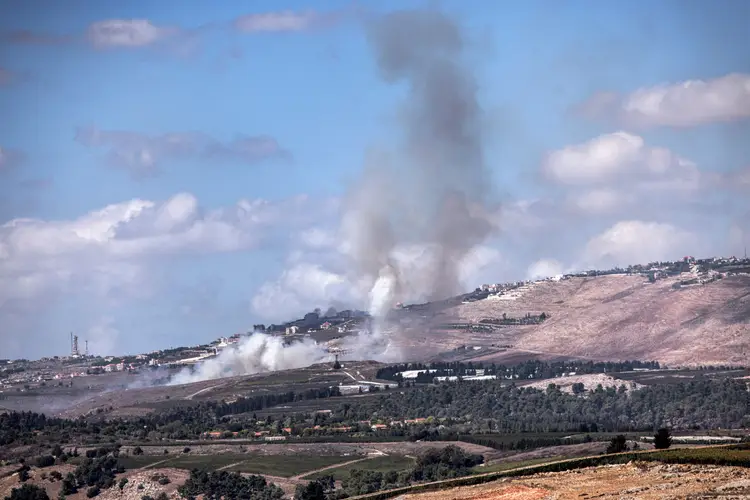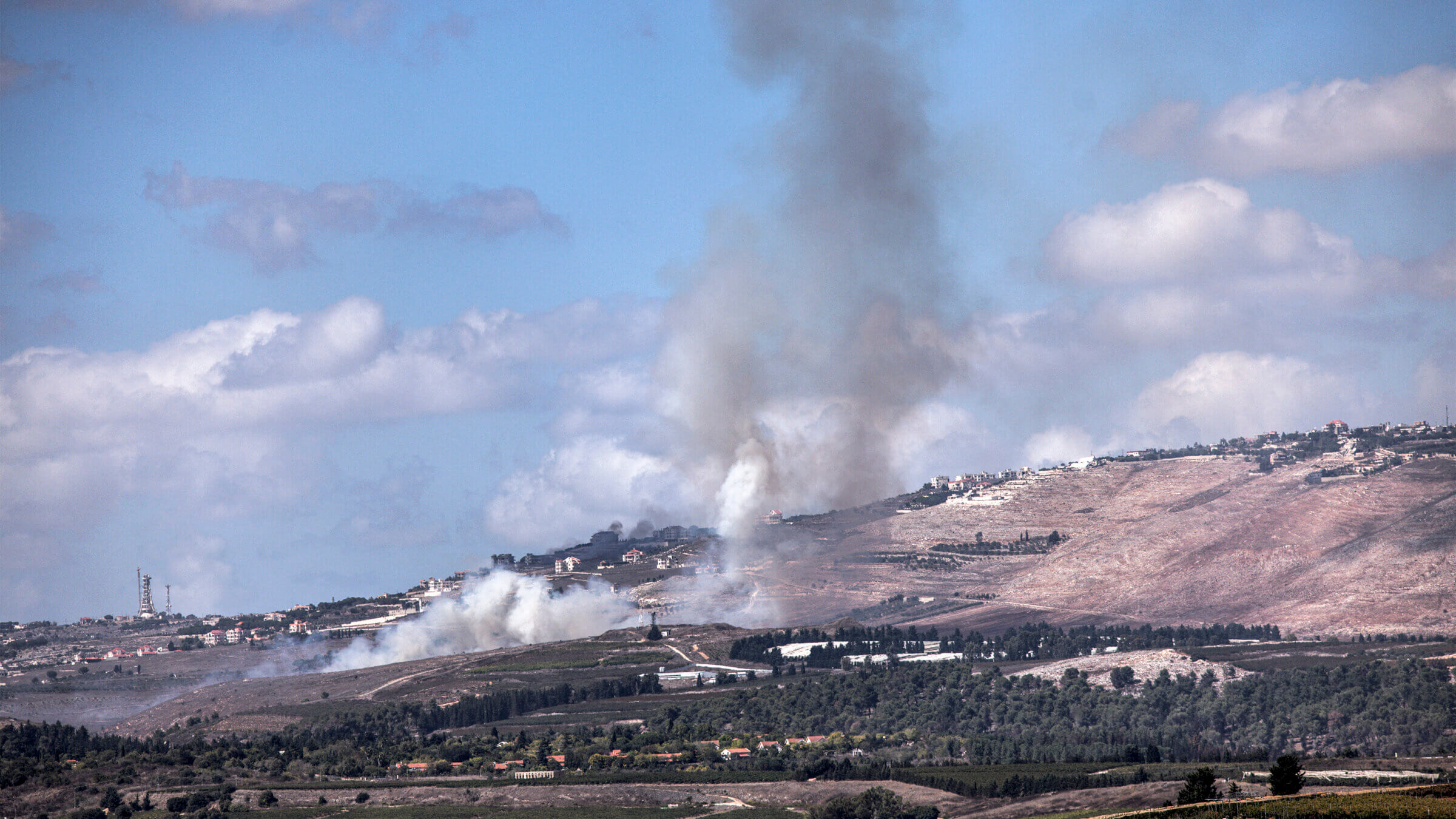This is the most disorienting Rosh Hashanah in memory

Smoke rises from a blaze that ignited after a rocket landed on the Israeli side of the Lebanon border in the Upper Galilee area of northern Israel on October 2, 2024. Image by Getty Images.

Guest Writer Jay Michaelson, October 2, 2024.
Rosh Hashanah tends to be a perplexing holiday, blending joy with seriousness, festivities with reflection. However, this year feels even more bewildering than ever before.
Tonight, Jews are heading to synagogue (or deciding not to) while the threat of Iranian missiles targeting Israel looms. Conversely, Israeli missiles could be aimed at Iran as well. We recognize that the anniversary of October 7 is approaching this Monday, and that Israeli hostages are still in the hands of Hamas. While we may have differing opinions on the implications of the Gaza War and the priorities chosen by the Israeli government, we share a sense of disorientation, confusion, uncertainty, and anxiety.
A friend recently sent me a Rosh Hashanah message where she intended to wish me “a sweet new year filled with amazing experiences.” However, either by mistake or due to autocorrect, it came out as “a sweet new tearful.” That pretty much sums it up!
The ongoing conflict in Gaza has been deeply painful and divisive for American Jews, but the current escalation of the situation is even more confusing. Regardless of whether we were in favor of, against, or had mixed feelings about the Gaza war, it brought immense sorrow: thousands of Palestinians lost their lives or were displaced, numerous soldiers died, and as of this week, there are still 97 Israelis being held hostage. After nearly a year of conflict, many liberal and centrist Jews feel that it’s well overdue for the Netanyahu administration to end the fighting, secure the return of the Israeli hostages, and agree to a ceasefire.
This time, things are not the same. In contrast to the situation in Gaza, Israel's actions towards Hezbollah have been more focused. The loss of any innocent life is heartbreaking, and sadly, many Lebanese civilians have been affected by the conflict. However, it's important to recognize that the scale of tragedy in Gaza is on a different level.
Hezbollah, despite some misguided and uninformed claims from certain left-wing individuals, is largely viewed as a detested group of religious extremists. They have seized control of parts of a nation that does not welcome them and often abuse local residents. Moreover, Hezbollah does not speak for the Palestinians living under occupation; they primarily serve the interests of Iran in seeking power in the region. I may not have the expertise to determine whether eliminating Hassan Nasrallah would improve Israel’s security, but I certainly don't feel any sympathy for him.
Additionally, a number of progressives (though certainly not all) found Israel’s recent approach to targeting Hezbollah communications quite noteworthy. While it’s true that some innocent individuals were affected by this operation, it’s difficult to imagine a more precise method of counter-terrorism than this. If this approach isn’t seen as justifiable, then what would be?

At present, it's difficult to have faith in the statements or actions of the Netanyahu administration. Currently, it seems that Bibi is holding off on pressure to launch an invasion of Southern Lebanon, but that situation could shift at any time. He still appears to be the same self-interested leader who is extending the conflict in Gaza instead of working towards a ceasefire that would bring the Israeli hostages back home.
Now let's talk about Iran. It's clear that a military reaction from them was likely given the circumstances. Israel's significant attacks on Hezbollah meant that Iran had to respond in some way, and it seems that their main focus has been on military objectives.
As someone with friends and family in Israel and who spent three years living there, the footage and stories of friends seeking refuge in shelters are deeply distressing to me. Although this current stage of the crisis has, thankfully, brought less suffering than the situation in Gaza, it has certainly created a lot more worry. What does the future hold? Will Bibi choose to intensify the conflict? Will Iran take further action?
Let’s take a closer look. We’re dealing with feelings of heartbreak and anxiety, mixed emotions about support for Israel, and doubts regarding its leadership. There’s also worry for innocent civilians caught up in the conflict, ongoing concern for the people in Gaza, and compassion for the hostages held by Hamas. Additionally, it’s that time of year when I reflect on my own actions and respond to the sound of the shofar, while still enjoying apples and honey and sharing festive meals with loved ones.
What have I overlooked? I haven't brought up the ongoing American election turmoil, the destruction caused by increasingly severe storms linked to the climate crisis, or the growing antisemitism and the painful reactions it has triggered, along with the way these issues are often exaggerated or manipulated. Plus, let's not forget the everyday challenges of parenting and just being a person in America during the 2020s.
The rabbi and meditation instructor within me feels compelled to express, both to you and to myself: That's quite overwhelming.
No, it’s not as challenging as what my friends in Beersheva and Haifa are experiencing at the moment, or what people I don't know are going through in Beirut, Rafah, and across the region, who are also enduring significant struggles. However, practicing self-compassion and understanding isn’t about comparing hardships. Others may have it tougher, but that doesn’t diminish the fact that this is still difficult (or at least bewildering and unsettling) for everyone.
What fosters my resilience is, interestingly enough, connected to Rosh Hashanah. It involves recognizing both linear and cyclical time, the changing of seasons and years, and returning to what is eternal and always present—a source of love and comfort. The verse from Ecclesiastes 1:6 illustrates this beautifully: "The wind goes around and then comes back again."
I’m not sure if this essence we’re talking about is God, love, the Universe, or just a mindset, and it’s beyond what I can fully understand. However, I do believe that we can experience both the passage of time and moments that feel eternal. We can find ourselves caught up in the chaos of Rosh Hashanah 5785 while simultaneously feeling a sense of inner peace that transcends that chaos, much like sensing both the gusts of wind and the wind itself.
Aside from that, I'm uncertain about what the future holds. Wishing you a Happy New Year!
Rabbi Jay Michaelson writes for both the Forward and Rolling Stone. He has published ten books and received the 2023 award for opinion writing from the New York Society for Professional Journalists.
The thoughts and beliefs shared in this piece belong to the author and may not represent the views of the Forward. Explore additional viewpoints in the Opinion section. If you want to reach out to the Opinion writers, you can email [email protected].
A Note From Our CEO Rachel Fishman Feddersen
I hope you found this article valuable. Before you continue, I'd like to encourage you to support Forward’s acclaimed journalism by participating in our High Holiday Monthly Donor Drive.
If you've relied on the Forward to gain insights into the world in the past year, we encourage you to consider making a donation now. Your contributions play a crucial role, providing us with the necessary resources to report from Israel, throughout the U.S., on college campuses, and wherever significant news affecting American Jews is occurring.
Consider making a monthly or one-time donation to help support Jewish journalism in 5785. For the first six months of your monthly contribution, your gift will be doubled, significantly boosting independent Jewish journalism.
— Rachel Fishman Feddersen, Founder and Chief Executive Officer













































